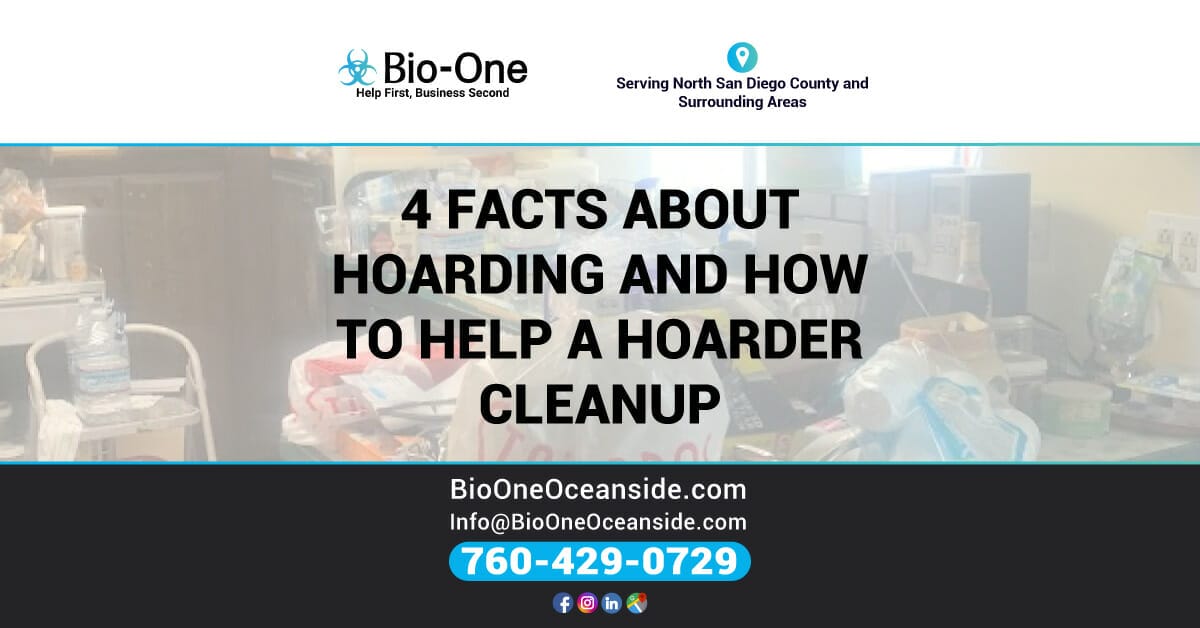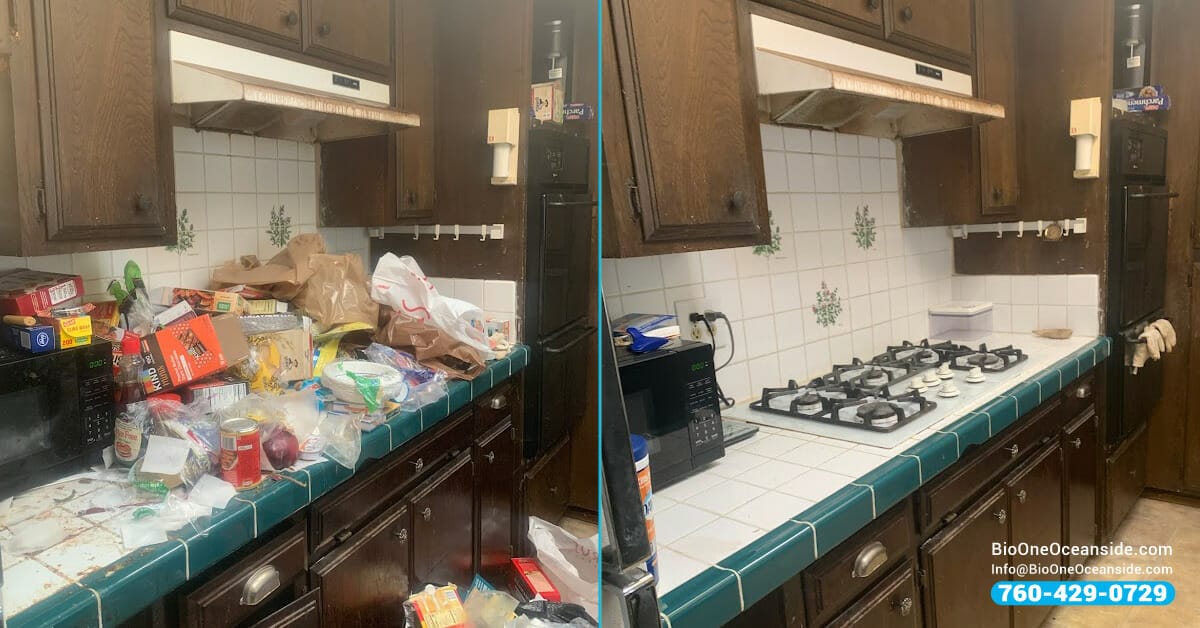
Bio-One of Oceanside is the trusted company to help a hoarder cleanup their home in the North San Diego County area and surrounding communities. We are sharing four facts about hoarding disorder everyone intending to help others should know. Around 2 to 6% of the U.S. population struggles with hoarding. As research develops around this topic, it’s clear, more so than ever, that hoarding is, in fact, a mental health disorder, and, as such, it must be treated with the appropriate level of respect and consideration.
The reasons for hoarding depend on each individual and their reality. It is wrong to assume that someone struggling with hoarding is doing it for the same reasons as others. However, symptoms come down to one specific problem: difficulty parting with their personal belongings.
Many people tend to mistake hoarding disorder with other conditions like depression, anxiety, and Obsessive-Compulsive Disorder. The reality is that a person struggling with hoarding disorder may be dealing with other mental health conditions as well, but they’re definitely not the same.
The same happens with clutterers. In a recent interview with The Sydney Morning Gerald, Peter Walsh, Organization and Decluttering Expert from Nine Network’s show Space Invaders, commented on the clear difference between hoarding and clutter problems. He said, “[Clutterers] are high-functioning people, just with a lot of stuff in their house. There’s never a problem with cleanliness or access to the house.”
Hoarders tend to struggle with major living functionality problems. The lack of proper hygiene poses a highly dangerous environment for the victims themselves and anyone to help. Hoarding is associated with fire hazards, diseases, infection from rotten food and waste, and the risk of falls caused by clutter in common traffic areas such as staircases and hallways, among other things.
Hoarders accumulate all sorts of things: newspapers, books, food, collectibles, household appliances… even animals. The things you would find on a hoarded property would surprise you because it’s never about what these possessions are worth. Hoarders are emotionally attached to their belongings, making it hard to even think about discarding them.
If you want to help a hoarder cleanup, you need to tread lightly, be considerate about their belongings, and keep a fluid communication with them to ensure the process goes as smoothly as possible. If this process becomes too challenging, remember we are here to help.
People may develop hoarding disorder after a traumatic life event. It can be a romantic separation, losing a loved one, a pet, a job… People may have difficulty assimilating these situations, so they turn to hoard as a coping mechanism. Maybe the things you find in the hoarded property remind the person of events and moments they’re not ready to let go of. Be very thoughtful when approaching these situations. Hoarding is an emotionally difficult process for everyone involved.
People struggling with hoarding disorder usually isolate themselves from family and friends. Embarrassment is common, too, as hoarded properties are usually in poor, unfavorable conditions.
The problem with hoarding disorder is that hoarders don’t see it as a problem. Unsurprisingly, they are not likely to seek help. If you think someone dealing with a hoarding disorder may be in danger, do not hesitate to call a professional. Doctors will assess the situation and diagnose the person based on information about the person’s living habits.
Hoarding disorder can be treated, and the expectations are favorable for those who receive help. Mental health professionals usually use Cognitive-behavioral therapy (CBT) and other decision-making exercises and techniques to educate the individual about their relationship with their belongings and possessions.
Eventually, the goal is to have the individual return to a safe, hazard-free environment. This process may be overwhelming and dangerous to tackle on your own. Don’t hesitate to turn to a professional to help a hoarder cleanup their home properly.
If you want to help a hoarder cleanup and restore their home, Bio-One of Oceanside’s certified technicians can help you. We are committed to helping our community in its greatest time of need. Hoarding is usually difficult to tackle due to the clutter and waste resulting from these situations. Bio-One of Oceanside works closely with victim advocate groups, hoarding task forces, and emergency responders to ensure everyone involved in a hoarding situation gets the help they need.

Bio-One of Oceanside is the #1 Disinfection, Sanitation, and Decontamination Company in North San Diego County, providing professional, industry standards services in all kinds of extreme scenarios:
Bio-One of Oceanside springs into action to assist survivors when a traumatic event occurs. We work with local law enforcement, emergency responders, victim advocacy organizations, hoarding task forces, apartment communities, and insurance companies to ensure that you receive the greatest service feasible.
We have been an independently owned and operated business since August 2020 to help our community through difficult and unexpected situations. Our certified technicians are caring, compassionate, and discreet, and we are ready to help you in your most significant time of need.
Bio-One is a proud member of the Southern California Rental Housing Association and Carlsbad, Oceanside, and Vista Chambers of Commerce. Bio-One serves all of San Diego County and neighboring regions, including Oceanside, Carlsbad, Vista, Fallbrook, Escondido, San Marcos, and Bonsall.
We also serve the Southern Orange County cities: San Clemente, Dana Point, Rancho Mission Viejo, Laguna Niguel, Ladera Ranch, San Juan Capistrano, Aliso Viejo, Laguna Woods, Laguna Beach, Lake Forest, Rancho Santa Margarita, Irvine, and Costa Mesa.
Our services are available 24/7, 365 days a year. Give us a call at 760-429-0729.